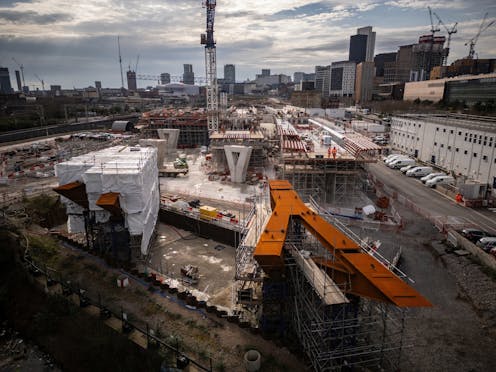
In the UK’s 2019 general election, regional inequality took centre stage. Conservative candidate Boris Johnson harnessed the widespread pro-Brexit sentiment and capitalised on how the Labour Party had been weakened under Jeremy Corbyn to storm to victory.
Johnson owed his win as much to turning to northern, traditionally Labour seats (in what has now become known as the “red wall”) as to the Conservatives’ tradiitonal southern heartlands. Bolstered by this newfound political strength in northern England, Johnson dubbed his flagship policy “levelling up”.
Few policy areas have truly cut through into the British public consciousness like the north-south divide has. This socioeconomic gap pitting London and the south of England against the more economically challenged north emerged during the Great Depression of the 1930s, with George Orwell, one of the first to identify it in his 1937 book, The Road to Wigan Pier.
Want more election coverage from The Conversation’s academic experts? Over the coming weeks, we’ll bring you informed analysis of developments in the campaign and we’ll fact check the claims being made.
Sign up for our new, weekly election newsletter, delivered every Friday throughout the campaign and beyond.
Governments have tried to address regional inequality ever since, with such questionable success. In my own research, I have likened the north-south divide to England’s equivalent of the Gordian knot. This legend, from the times of Alexander the Great, told of a problem so intractable that only a jarring solution could solve it. Alexander slashed the knot in two with his sword. To date, however, successive British politicians have failed to locate their sword.
With levelling up, Johnson might have appeared to be bucking that trend, on being elected in 2019. But two years on from his departure from office, the Labour party is poised to cancel the programme altogether should it win on July 4. The question, then, is what could replace it.
A post-Brexit policy
The Cameron government’s equivalent to levelling up was the northern powerhouse, which focused on the development of the north in general. Although rhetorically similar, Johnson’s levelling up policy aimed to expand powers away from the cities and towards the rest of the country.
Levelling up was inextricably tied to the post-Brexit environment. It sought to remedy the perceived revolt, espoused by the Leave campaign, against years of city-focused policy.
Rather than simply addressing north-south divisions, Johnson’s rhetoric focused on levelling up all places. His policy, meanwhile, spoke of focusing on the places specifically affected by Brexit. This predominately meant towns.
Further, following the UK’s departure from the EU, the government was set to be faced with a massive funding gap previously filled by the European structural funds, amounting to nearly £10 billion.
Johnsons’s solution was to devise three funds: the towns fund (worth £3.6 billion), the shared prosperity fund (eventually worth £2.6 billion), and the levelling up fund (worth £4.8 billion). The towns fund focused exclusively on England, as did, initially, the levelling up fund until pressure from the devolved governments forced a U-turn.
In practice however, as research has shown, these monies did not reach the places of most need. In Wales, the shared prosperity fund yearly allocation of £30 million was only 8% of what the nation had previously received through EU funding. This prompted the then finance minister, Vaughan Gething, to say that Wales now had “less say over less money”.
Elsewhere, news reports showed that in the first allocation of towns fund money, 39 of the 45 towns were in Conservative-held areas, amid allegations that ministers had ignored civil service advice in order to fund low-priority areas.

My colleague Olivier Sykes and I have shown that the towns fund also overlooked seemingly obvious recipients, including Blackpool and Stoke-on-Trent, two of the most deprived local authorities in England.
Our research has shown that the shared prosperity fund was distributed in similarly unequal ways. Here, every local authority was allocated a rank (tier 1, 2 or 3) roughly corresponding to decreasing levels of priority.
While 18 of the 20 most deprived local authorities were allocated tier 1 status, we found that other much less deprived areas (including High Peak, Richmondshire and Derbyshire Dales) were also awarded the same tier 1 status. At the same time, deprived areas including Hackney, Salford and Tower Hamlets were overlooked for tier 1 status.
Going further, and mirroring the accusations of pork-barrel politics which have surrounded the towns fund, each of those less-deprived areas was held by a Conservative MP. These included Rishi Sunak’s seat of Richmondshire.
It is clear, then, that despite a decade of northern powerhouse, levelling up and post-Brexit funding, the rhetoric has not delivered. The UK remains thoroughly divided, that Gordian knot well and truly fastened. Indeed, the cancellation, since 2021, of both northern spurs of the high-speed rail network, HS2 – a crucial tool for getting levelling up done – gives the feeling of a policy moving in reverse, not advancing.
Alex Nurse does not work for, consult, own shares in or receive funding from any company or organisation that would benefit from this article, and has disclosed no relevant affiliations beyond their academic appointment.
This article was originally published on The Conversation. Read the original article.







